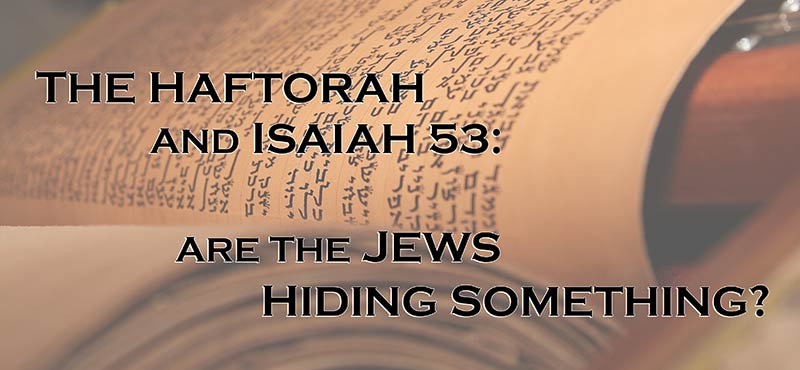The Haftorah and Isaiah 53: Are the Jews Hiding Something?
Question:
Dear Rabbi,
Missionaries claim that we are so “scared” of Isaiah 53 that we have omitted it from the Haftorah reading when it comes up. I know this can’t be true, but what should be my response when this is brought up? Thank you.
Answer:
This well-worn claim that the Jews have deliberately removed Isaiah 53 from theHaftorah because rabbis are “so scared” that their worshipers might bolt from their synagogues for the local baptism pool upon hearing this chapter read aloud from the pulpit is a popular argument used by missionaries to sustain their christological interpretation of Isaiah 53.
This contention, however, is so devoid of merit that I often find it difficult to know where to begin in my response.
Let’s start by exploring the origin of the Jewish tradition to read a portion of the Haftorah on the Sabbath day.
Those unfamiliar with the source of the custom to read the Haftorah might conclude from this missionary argument that the Jews read all of the Prophets during the yearly cycle (as we do the entire Pentateuch), and we somehow only leave out Isaiah 53 from the annual reading of the Haftorah. Actually, less than five percent of the prophets are read during the Sabbath service throughout the year.
The Jewish people adopted the custom to read the Haftorah long before the advent of Christianity. During the traumatic events that led to the festival of Chanukah, Antiochus Epiphanes IV (ruled from 175-164 B.C.E.) decreed that it was forbidden for the Jews to read the Torah in his effort to eradicate the Jewish faith. To circumvent this spiritual crisis, the Jewish people began to read from a selected portion of the Prophets on each Sabbath to substitute the designated reading from the Torah. This custom was retained after the decree was rescinded.
The particular Sabbath portion of the Prophets was carefully selected for one of two reasons. Either because the theme of a segment of the Prophets closely correlated to the portion of the Torah read that week, or because that section of the Prophets thematically corresponded to a festival or a historical circumstance during that Sabbath. It is therefore easy to understand why Isaiah 53 is never read in the synagogue. Isaiah 53 bears no relationship to any of the chapters of the Pentateuch and is unrelated to any holiday or historical circumstance on the Jewish calendar. Therefore this chapter was not included in any Haftorah portion.
It probably would come as a surprise to many missionaries that not only is Isaiah 53 never read in the synagogue on the Sabbath, but neither are Isaiah chapters 3, 13, 23 or 33 for that matter. It should be obvious that Christian polemics played no role in the Haftorah selection as evidenced by the fact that Isaiah 9:5-6 is read in the Haftorah, which is a text widely used by missionaries to support the doctrine of the Trinity.
Needless to say, this missionary argument is particularly preposterous when we consider that the custom to read the Haftorah in the synagogue was implemented more than 2,150 years ago, long before the Christian era. It is puzzling why missionaries are unaware of this fact when the custom to read the Haftorah is mentioned quite clearly in the New Testament (Acts 13:14-15), long before the Jewish people could have an inkling that a heretical sect would emerge that would misinterpret this extraordinary chapter.
This remarkable claim that the Jews expunged Isaiah 53 from the Haftorah is probably the most anti-Semitic argument used by missionaries. It thrives on and perpetuates the medieval Christian portrait of the Jews – a cunning, scheming, diabolical bunch – who are capable of rejecting Jesus, although deep down – in their heart of hearts, believe in him and have conspired to make sure that every other Jew rejects him. Only the Devil is capable of this dastardly deed. In other words, although the Devil knows the truth and believes in God, he rejects Him and seduces others to do the same. This dark portrait of the Jew as the Devil (John 8:44) is as old as Christianity itself, and things haven’t changed much.
Sincerely yours,
Rabbi Tovia Singer

No Comments